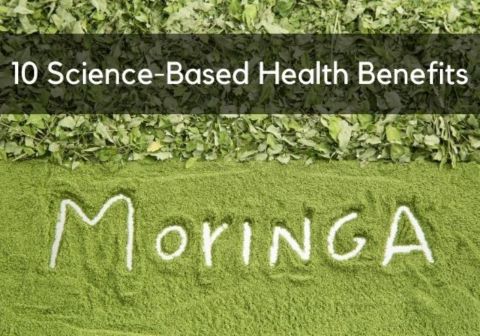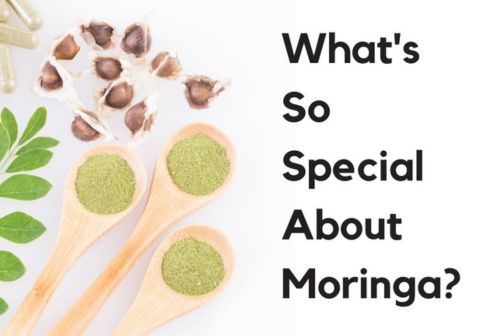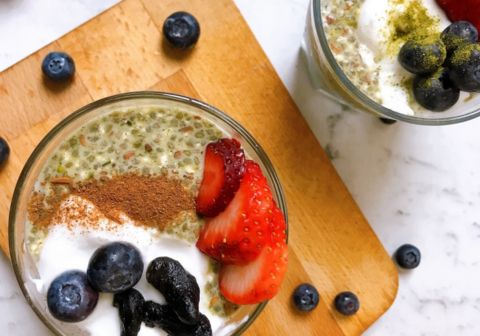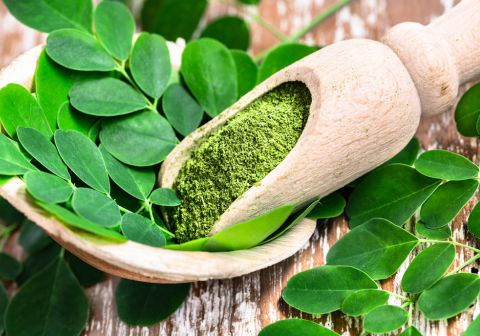Unveiling the Power of Moringa
Moringa Benfits
Explore the amazing benefits of moringa, known as the “miracle tree.” Rich in vitamins, minerals, and antioxidants, moringa supports a healthy lifestyle. From boosting immunity to improving skin and hair, learn how this superfood can enhance your well-being. Let’s uncover the simple ways to include moringa in your diet for a healthier you.

Powerful Health Benefits
Uncover the secrets behind moringa's healing powers.

Nutrition and Wellness
Understand moringa's nutritional profile and impact on well-being.

Moringa in Your Meals
Simple tips for using moringa every day.
Top Health Benefits of Moringa
Dive into the world of moringa, a superfood with unparalleled health benefits for men, women, and overall wellness. Explore our blog posts to learn how incorporating moringa into your diet can lead to a healthier, more vibrant life:
These top 10 moringa health benefits supported by scientific research you need to know.
Uncover the ways moringa enhances male vitality. 3 Remarkable Reasons for adding Moringa oleifera to your diet.
There are countless benefits of moringa for females, and this superfood has been shown to be particularly beneficial for women’s health.
Are you a diabetic or do you have a friend or family member who has diabetes?
Nature’s Multi-Vitamin
Nutritional Profile of Moringa
Moringa Oleifera stands out with over 125 phytonutrients, as studies highlight. This nutritional giant offers a wealth of vitamins and minerals essential for health. Explore the depth of moringa’s nutritional offerings and see why it earns the name “The Tree of Life”.
VITAMINS
Moringa is a significant source of vitamins A, C, and E, which are crucial for immune function, skin health, and antioxidant protection. It also contains:
- Vitamin A: Supports vision, skin health, and a strong immune system.
- Vitamin C: Boosts immunity, aids collagen production, and acts as an antioxidant to protect cells.
- Vitamin E: Acts as a powerful antioxidant, promoting skin health and protecting against oxidative damage.
- Vitamin K: Essential for blood clotting and bone health.
- Vitamin B1 (Thiamine): Supports energy metabolism and nerve function.
- Vitamin B2 (Riboflavin): Assists in energy production and cell growth.
- Vitamin B3 (Niacin): Promotes heart health, skin health, and proper digestion.
- Vitamin B6 (Pyridoxine): Supports brain development, metabolism, and immune function.
- Vitamin B9 (Folate): Essential for DNA synthesis, cell growth, and fetal development during pregnancy.
- Vitamin B5 (Pantothenic Acid): Aids in metabolism and the production of fatty acids and cholesterol.
MINERALS
It’s packed with minerals such as calcium, potassium, iron, magnesium, phosphorus, and zinc, supporting bone health, cardiovascular health, and overall bodily functions.
- Calcium: Supports bone health and muscle function.
- Potassium: Regulates blood pressure and aids in heart health.
- Magnesium: Essential for muscle and nerve function, bone health, and blood glucose regulation.
- Phosphorus: Vital for bone and teeth formation, energy metabolism, and cell repair.
- Sodium: Helps maintain fluid balance and nerve function.
- Iron: Necessary for oxygen transport in the blood and preventing anemia.
- Zinc: Supports immune function, wound healing, and DNA synthesis.
- Selenium: Acts as an antioxidant and supports thyroid function.
- Copper: Facilitates iron absorption, supports bone health, and aids in the formation of red blood cells.
- Manganese: Essential for bone formation, blood clotting, and antioxidant defence.
ANTIOXIDANTS
Moringa contains a range of antioxidants, such as quercetin, which may lower blood pressure, and chlorogenic acid, which can help moderate blood sugar levels after meals. These compounds help combat oxidative stress and reduce the risk of chronic diseases.
- Quercetin: Helps lower blood pressure and has anti-inflammatory properties.
- Chlorogenic acid: Aids in regulating blood sugar levels and may have anti-cancer effects.
- Beta-carotene: Converts to vitamin A, supporting vision and immune function.
- Kaempferol: Has anti-inflammatory and anti-cancer properties.
- Rutin: Supports blood vessel health and has antioxidant effects.
- Chlorophyll: Detoxifies the body and may have anti-cancer properties.
- Quercetin: Helps reduce inflammation and lower blood pressure.
- Beta-sitosterol: Supports heart health and may reduce cholesterol levels.
- Caffeoylquinic acid: Has antioxidant and anti-inflammatory properties.
- Zeaxanthin: Supports eye health by protecting against UV radiation.
- Lutein: Protects the eyes and may reduce the risk of age-related macular degeneration (AMD).
ANTI-INFLAMMATORIES
Moringa has various phytonutrients and anti-inflammatory compounds, contributing to its potential health benefits, including supporting digestion, improving energy levels, and reducing inflammation.
- Quercetin: Reduces inflammation and acts as an antioxidant.
- Kaempferol: Has anti-inflammatory and antioxidant effects.
- Chlorogenic acid: May help reduce inflammation and regulate blood sugar levels.
- Beta-sitosterol: Exhibits anti-inflammatory properties and supports heart health.
- Caffeoylquinic acid: Has antioxidant and anti-inflammatory effects.
- Isoquercetin: Reduces inflammation and may have anti-cancer properties.
- Rutin: Supports blood vessel health and has anti-inflammatory effects.
- Zeaxanthin: Protects against oxidative stress and inflammation.
- Lutein: Exhibits anti-inflammatory properties and supports eye health.
ENZYMES
Moringa contains enzymes that are crucial for various bodily functions. Enzymes are proteins that act as catalysts in the body, speeding up chemical reactions necessary for digesting food, supporting metabolism, and facilitating numerous other physiological processes.
- Superoxide dismutase (SOD): Acts as a powerful antioxidant, protecting cells from oxidative damage and supporting overall health.
- Polyphenol oxidase (PPO): While not directly beneficial for health, its presence may contribute to the preservation of moringa’s nutritional content.
- Catalase: Helps neutralize harmful hydrogen peroxide, reducing oxidative stress and promoting cellular health.
- Phosphatase: Supports nutrient absorption, aiding in bone health and overall metabolism.
- Dehydrogenase: Facilitates energy production and metabolic processes, contributing to overall vitality.
- Protease: Assists in protein digestion, ensuring efficient utilization of dietary proteins for growth and repair.
- Amylase: Facilitates starch digestion, improving carbohydrate metabolism and energy release.
- Lipase: Promotes efficient fat digestion and absorption, supporting overall digestive health.
- Cellulase: Aids in breaking down plant cell walls, potentially enhancing nutrient availability.
- Ribonuclease: May play a role in RNA digestion, although its direct health benefits in moringa consumption are not well-established.
AMINO ACIDS
The plant provides all nine essential amino acids, making it a rare plant-based source of complete protein, vital for muscle growth, repair, and overall health.
- Valine: Supports muscle growth, tissue repair, and energy production.
- Threonine: Aids in collagen formation, promoting skin, hair, and nail health.
- Isoleucine: Assists with muscle development, immune function, and energy regulation.
- Leucine: Essential for muscle protein synthesis and blood sugar regulation.
- Phenylalanine: Precursor to neurotransmitters, impacting mood and cognitive function.
- Methionine: Supports tissue repair, detoxification, and healthy skin.
- Histidine: Essential for the production of histamine and red blood cells.
- Lysine: Vital for collagen formation, immune function, and calcium absorption.
- Tryptophan: Precursor to serotonin, influencing mood and sleep.
- Arginine: Aids in blood vessel relaxation, immune function, and wound healing.
- Serine: Necessary for the synthesis of proteins, nucleic acids, and antibodies.
- Glycine: Supports muscle and tissue repair, cognitive function, and sleep.
- Cystine: Important for hair, skin, and nail health, as well as detoxification.
- Aspartic Acid: Involved in energy production and neurotransmitter synthesis.
- Glutamic Acid: Acts as a neurotransmitter and supports brain function.
- Proline: Essential for collagen production, promoting skin and joint health.
- Alanine: Plays a role in energy production and muscle function.
- Tyrosine: Precursor to dopamine, norepinephrine, and epinephrine, impacting mood and stress response.
Incorporate Moringa into Your Diet
Transform your meals and refresh your drinks with the power of moringa! Check out our posts below for easy-to-follow moringa recipes that promise to delight your taste buds and boost your health.
Moringa powder has a mild, grassy version of green tea-like smell. It tastes like “matcha” with a bit of earthly and vegetable-like flavour.
Smoothies are becoming a convenient and great choice for healthy eaters, and it’s super easy to make. Here are 9 recommended smoothie recipes with herbs for you!
Your Path to Wellbeing Begins with Moringa
Ready to Transform Your Health? Shop our premium moringa products and start experiencing the profound benefits today. Your journey towards a healthier, more vibrant life starts here!
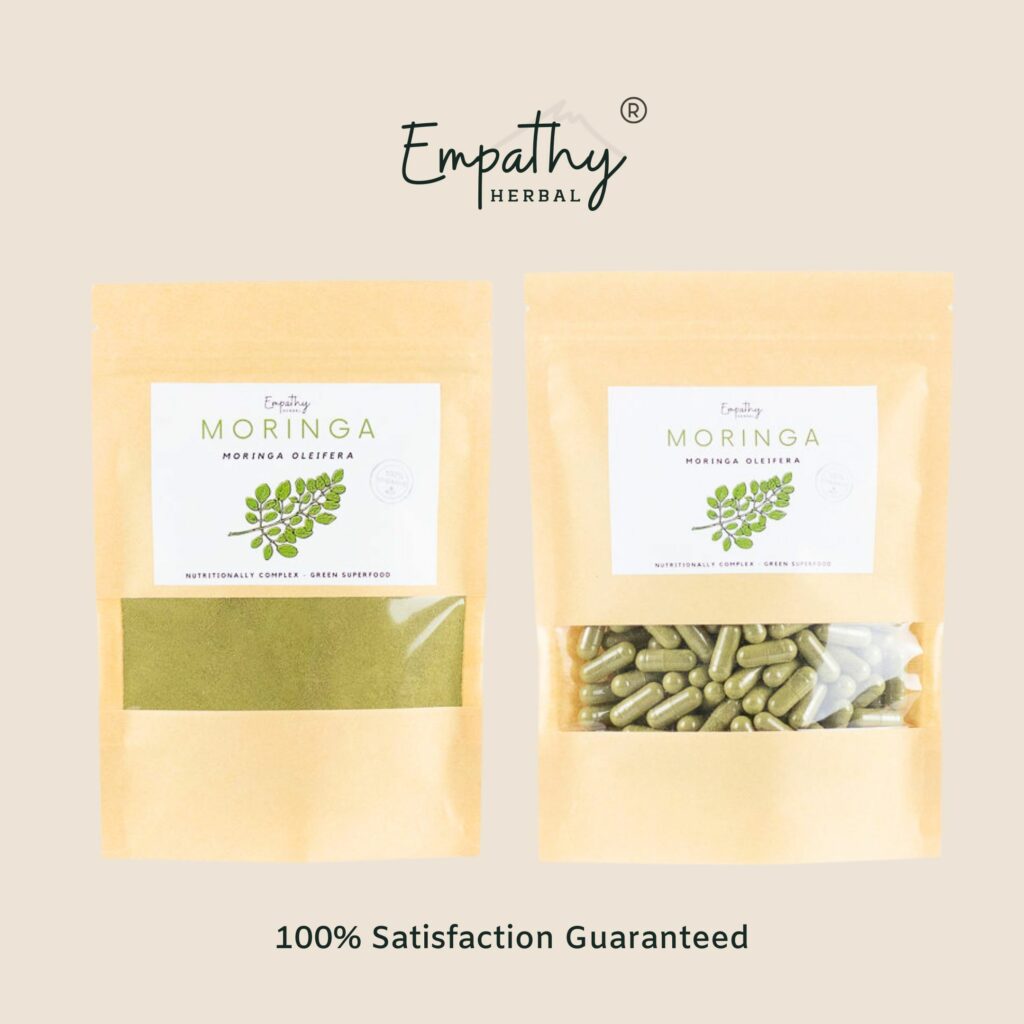
Expand Your Moringa Knowledge: Related Articles
Are you curious to learn more about moringa and its extensive benefits? This section guides you to additional articles that delve into the science, stories, and strategies surrounding moringa
Moringa oleifera is a highly revering herbal remedy with an impressive nutrition profile. These FAQs can help you to…
